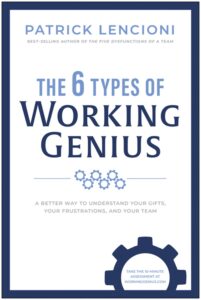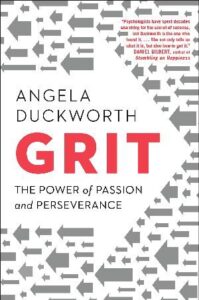In this episode of the Business Broken to Smokin’ Podcast:
Lodestone True North’s Head Coach Mark Whitmore interviews Kolbe Certified Consultant Kimberly Dyer. How we work, and the Kolbe A – assessment.
https://www.kolbe.com/
https://www.kolbe.com/kolbe-wisdom/#ConativeMind
0:00 Intro
5:42 Book reference — Traction by Gino Wickman
7:28 What does it look like to get certified in Kolbe?
10:19 What are these assessments measuring and why are they valuable?
Differences between 3 types of assessments:
- Affective (Feeling)
- Cognitive (Thinking)
- Conative (Doing – How you take action when you have the freedom to be yourself)
13:36 Why should we do any assessment?
15:01 Ergs…
17:20 “Imagine if you could accomplish your goals, objectives, with less people, or with the same people that aren’t burned out. You’d have a retention device built-in. You’ll probably start attracting people because they are hearing: ‘This is a great place to work.’”
18:56 ROI on assessments…
- Less mistakes because of miscommunication
- Better collaborative team
- Better predictable results when you put a team together
20:09 What are some other note-worthy assessments?
20:30 The 6 Types of Working Genius (Patrick Lencioni) https://www.workinggenius.com/
20:58 DISC
21:38 Book Reference – Drive by Daniel Pink
22:01 Mark’s M3M tool – https://youtu.be/NR9kRJFSYcc?t=318
23:13 Reference to other assessments:
- Strengthsfinder https://www.gallup.com/cliftonstrengths/en/strengthsfinder.aspx
- DISC https://www.discprofile.com/what-is-disc/how-disc-works/
- Culture Index https://www.cultureindex.com
- Predictive Index https://www.predictiveindex.com
24:09 What’s the difference between affective, cognitive, and conative?
25:50 Book Reference – 6 Types of Working Genius by Patrick Lencioni
29:04 Book Reference – Grit by Angela Duckworth
29:46 Ideal pairing with Kolbe…
31:31 What does the actual Kolbe assessment look like? (It’s not a test) www.kolbe.com
37:18 “You’ve got a perfect score!” (Strengths-based assessment)
37:57 The 4 Numbers
- Red – Fact Finder (How you gather and share information)
- Blue – Follow Thru (How you use systems and processes, organizing)
- Green – Quick Start (How you handle risk and uncertainty)
- Yellow – Implementor (not implementer) (how you handle physical or tangible space/objects)
Different Kolbe assessments:
- Kolbe A (who your are truly in your natural state)
- Kolbe B (how you see your job)
- Kolbe C (how a supervisor would create for an ideal candidate)
46:00 How to do this without creating more problem? Half day workshop looks like…
49:58 Explain what the ranges are, hierarchy from left to right…
 50:53 Fact Finder (Red)
50:53 Fact Finder (Red)
The instinctive need to probe and the way we gather and share information.
Behavior ranges from gathering detailed information and documenting strategies to simplifying and clarifying options. This Action Mode deals with detail and complexity, providing the perspective of the past. LEARN MORE
1-3 Simplify (Start with end in mind, sees big picture)
4-6 Like and need to explain, fact checking along the way
7-10 Strategizing, looking for patterns
53:02 How do these conflict or get along?
54:32 Roles for different levels of fact finder…
 56:38 Follow Thru (Blue) – Systems and processes. Digital files and physical files…
56:38 Follow Thru (Blue) – Systems and processes. Digital files and physical files…
The instinctive need to pattern and the way we organize and design.
Behavior ranges from being systematic and structured to being adaptable and flexible. This Action Mode deals with structure and order and provides focus and continuity. LEARN MORE
1-3 Adapting
4-6 Maintaining the preexisting systems
7-10 Systemization (executing on current or creating new)

1:04:46 Quick Start (Green) – Risk and uncertainty
The instinctive need to improvise and the way we deal with risk and uncertainty.
Behavior ranges from driving change and innovation to stabilizing and preventing chaos. This Action Mode deals with originality and risk-taking and provides intuition and a sense of vision. LEARN MORE
1-3 Stabilization to the chaos (resist straying from the plan)
4-6 Modify
7-10 Innovators
1:08:13 Implementor (Yellow) – Haptics (tangible tools, physical space)
The instinctive need to demonstrate and the way we handle space and tangibles.
Behavior ranges from making things more concrete by building solutions to being more abstract by imagining a solution. This Action Mode deals with physical space and provides durability and a sense of the tangible. LEARN MORE
1-3 Envisioning (how’s it going to look)
4-6 Restoration or preservation
7-10 Pick up tools and start building
1:09:05 Reference to Frank Gehry https://www.biography.com/artist/frank-gehry
1:14:50 How many ergs should we spend at work?
1:17:49 Tips or next steps…
1:21:40 Five desert island books
- The Book Thief by Markus Zusak
- Four Seasons in Rome by Anthony Doerr
- Untethered Soul by Michael A. Singer
- Ann Rivers books – https://www.bookseriesinorder.com/anne-rivers-siddons/
- Clive Cussler – the Dirk Pitt series https://www.bookseriesinorder.com/dirk-pitt/
**Credits**
Music – Workin for a living – Huey Lewis & The News
Website: https://www.lodestonetruenorth.com
Website: https://www.bigeasydesk.com (The best co-working space in Northeast Ohio!)
LinkedIn Book Club Group: https://www.linkedin.com/groups/14158790/
LinkedIn Mark: https://www.linkedin.com/in/mark-whitmore-lodestone/
LinkedIn Lodestone: https://www.linkedin.com/company/lodestone-true-north
Lodestone Online Courses: https://lodestone.thinkific.com
Podcast: (Make sure you click on Subscribe so you don’t miss any episodes!)
YouTube (video)
https://youtube.com/@lodestonetruenorth
Spotify (video or audio)
https://open.spotify.com/show/3QCsZ7fyKr4z804oTac3FU
Apple Podcasts (audio)
https://apple.co/3O4uv4H
Other Podcast Platforms
https://lodestonetruenorth.com/podcast/

